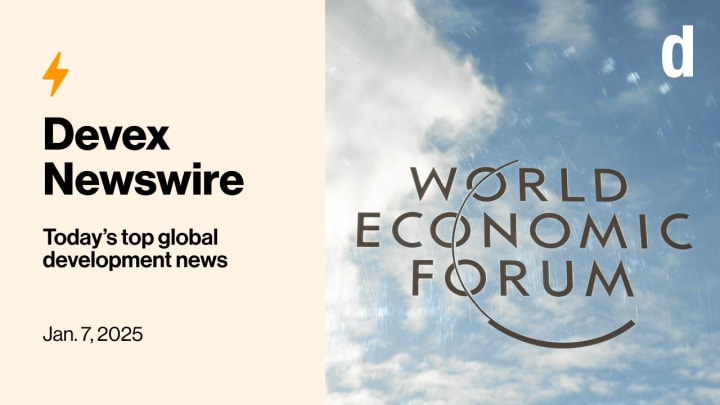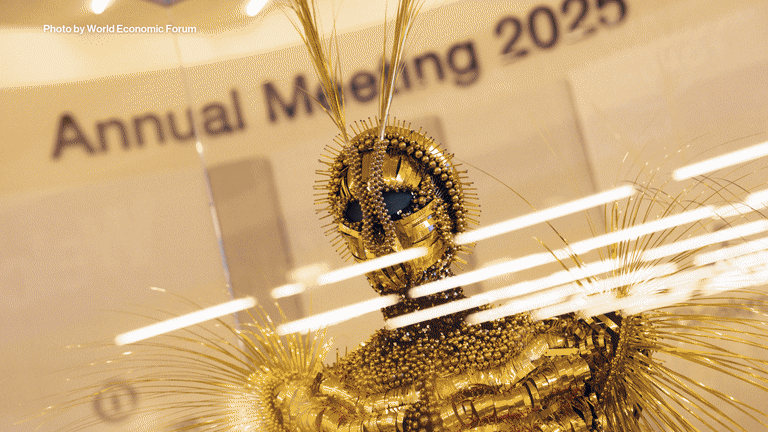
It's only January, but the year has already filled up with crucial moments to watch throughout 2025. We have your cheat sheet.
Also in today’s edition: A plea to make the most of one of those moments, and a social innovator who takes scale to another level.
+ Devex President and Editor-in-Chief Raj Kumar will discuss the trends that will shape the world of global development this year, followed by an “ask me anything” session. Join us for that on Wednesday.
Snow banks
This is a preview of Newswire
Sign up to this newsletter for an inside look at the biggest stories in global development, in your inbox daily.
In less than two weeks, hundreds of well-heeled travelers will trade in their dapper footwear for practical snow boots and make their way to the ski resort town of Davos, Switzerland, for the World Economic Forum, which starts Jan. 20.
WEF is a magnet for the corporate elite but also a broad cross-section of society, from politicians and academia to us humble journalists (who always wear practical shoes anyway). While Davos gets dinged for its parties and wealth (some attendees use helicopters as their mode of transport), it is also a space for serious deal-making. This year, for instance, marks 25 years since Gavi, the Vaccine Alliance was born in Davos.
We’ll be on the snowy ground to bring you the latest deals, scoops, and other developments relevant to our community.
However, Davos is only the tip of the iceberg.
Next up is the Munich Security Conference in February. While the thrust of the event is international security, it has implications for global development and humanitarian aid. Last year’s event, the 60th iteration of MSC, featured discussions on sustainable development, climate finance, food systems, global refugee movements, and humanitarian law.
Other major moments to pencil into your calendar include the World Bank and International Monetary Fund Spring Meetings in Washington, D.C.; the World Health Assembly in Geneva, where negotiators will try to finalize a pandemic accord; and London Climate Action Week.
Casting a shadow over these gatherings is of course the reelection of Donald Trump and what his second presidency means for U.S. foreign policy commitments. We’ll be closely following all the ups and downs — and there are sure to be a lot of them — to distill what actually came of these moments and why it matters.
To get in touch with us about Davos tips, reach out to Devex Global Development Reporter Elissa Miolene at elissa.miolene@devex.com.
Read more: The key global development moments Devex is watching in 2025 (Pro)
Background reading: The development stories we’re watching at Davos 2024
+ Not a Devex Pro member yet? Start your 15-day free trial today to access all our expert analyses, insider insights, funding data, events, and more. Check out all the exclusive content available to you.
Continental credit
Also of note for 2025 is the Fourth International Conference on Financing for Development, or FfD4, in Spain at the end of June. The U.N.-orchestrated event only takes place once every 10 years and explores ways to reform the global financial architecture and close the $4 trillion annual financing gap to achieve the U.N. Sustainable Development Goals.
“This gathering comes at a critical time, as the global economy faces headwinds, multilateralism weakens, and conflicts escalate,” write Rob Floyd of the African Center for Economic Transformation; Mma Amara Ekeruche of the Centre for the Study of the Economies of Africa; Martin Kessler of the Finance for Development Lab; and Kenyan lawyer Beverly Musili in an opinion piece for Devex.
They zero in on how FfD4 is particularly critical to Africa and its global partners, especially in the wake of gains that have stagnated or gone backward.
“Progress on poverty reduction in Africa has stalled since the last FfD conference in Addis Ababa in 2015. Extreme poverty declined marginally from 36.7% in 2019 to 36.5% in 2024. External shocks, including COVID-19 and the mounting impacts of climate change, have reversed earlier gains,” they write, outlining their recommendations for the fourth iteration of FfD.
Among them:
• Fairer perceptions of risk to attract diverse investors.
• Incentives for low-emission growth pathways.
• Recognition and rewards for Africa’s contributions to global public goods.
• Regional mechanisms to protect against global volatility.
“For Africa, the consequences of ambitious rhetoric without corresponding action are stark,” they warn.
Opinion: The world must reshape global finance at 2025 UN summit
Hundreds to billions
Most social innovations die in pilot purgatory. But one country in particular has shown that true scale — we’re talking north of 1 billion people — is possible: India.
Many stories of social innovation in India come back to the vision and philanthropy of Nandan and Rohini Nilekani — think of the groundbreaking digital ID system Aadhaar, the national payments system Unified Payments Interface, and the teachers’ education platform DIKSHA.
Enter Sanjay Purohit, one of the Nilekanis’ closest collaborators, who has gone from Infosys executive to social innovator and now heads the Centre for Exponential Change in Bangalore. Purohit has pioneered “societal thinking” — an approach that aims to bring the thinking behind India’s innovations to the world.
In the latest Devex Book Club podcast episode, Purohit sits down with Devex President and Editor-in-Chief Raj Kumar to discuss his book “Think Scale,” a unique field guide that bridges Silicon Valley-style scaling with grassroots innovation.
For a development sector trying to untangle an increasingly complex set of problems, Purohit is a big thinker with unconventional ideas for how to untie the Gordian knot.
Listen: Inside the mind of Sanjay Purohit, a societal transformation expert
Mining for money
A Silicon Valley startup that uses artificial intelligence to unearth mineral deposits of copper, lithium, and nickel just got a huge boost in its latest funding round — to the tune of $537 million. The company, KoBold Metals, is backed by Jeff Bezos and Bill Gates’ Breakthrough Energy Ventures, among others, and has been valued at $2.96 billion.
KoBold Metals was founded in 2018 and uses satellite images and drilling reports to locate mines, my colleague Jesse Chase-Lubitz tells me. In 2023, the company said it aimed to produce copper and cobalt at a project in Zambia within 10 years. Last year, KoBold found the Mingomba mine in Zambia, which the Zambian government has projected to be the largest copper mine in the country once it's fully operational.
KoBold signed a memorandum of understanding with the African Finance Corporation in October 2024 and has committed to providing more than 300,000 tons of copper for the Lobito Corridor project, which will connect Angola, Zambia, and the Democratic Republic of Congo by rail.
The flagship project, one of the last moves in office for outgoing U.S. President Joe Biden, will be among the first large-scale infrastructure investments in Africa, something often monopolized by China.
ICYMI: The Lobito corridor, a flagship Biden project’s progress and future (Pro)
Where help is needed
The DRC is known for its abundant natural resources, such as cobalt and copper minerals, and is home to vast arable land and hydropower potential.
While bursting with potential, the country has been plagued by a long history of bloody conflicts and political turmoil over said resources. As a result, there is an urgent need for development and humanitarian workers in the country, my colleague Genevieve Gregorio writes.
In the latest installment of our popular series on global development opportunities based on Devex job board data analysis, we look at the top hiring organizations in the DRC. Among the list: the World Food Programme, UNICEF, and U.N. Development Programme. To read the rest, check out the article.
Read: The top development employers in the Democratic Republic of Congo (Career)
+ Your ultimate guide to development’s top sectors: Our latest career guide is our biggest one yet and balances need-to-know essentials with new salary data insights and insider advice on working in global development’s leading sectors.
This is exclusively for Career Account members. Not yet a member? You can try it out with a free 15-day trial to access all career advice guides, events, and articles, our full job board, and much more.
In other news
French physician Louis Schittly, one of the founders of Médecins Sans Frontières, died on Jan. 1, the charity group has confirmed. [The Washington Post]
WFP has accused Israel of firing at its convoy near the Wadi Gaza checkpoint despite having clearly marked vehicles and receiving necessary clearances from Israeli authorities. [Barron’s]
U.N. leaders have urged action on the staggering humanitarian crisis in Sudan, as the ongoing conflict has now resulted in 11.5 million people internally displaced and is causing famine to spread in more areas. [UN News]
Sign up to Newswire for an inside look at the biggest stories in global development.




